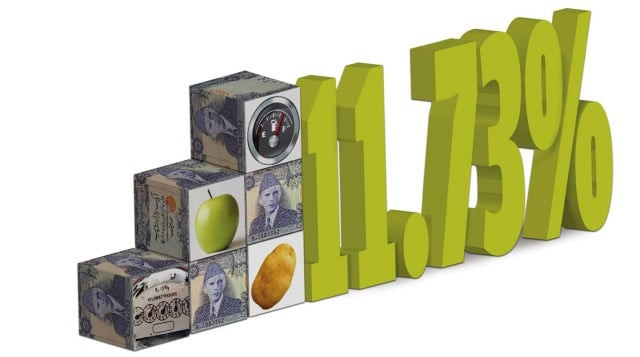Inflation rises 11.73%

The average inflation for the period July 2009 to June 2010 is more than the government’s target of 9.5 per cent, which may lead to tight fiscal and monetary policies during the current fiscal 2010-11.
“There is no complacency as inflation numbers are on the higher side and the government could have done more to restrict the surge in prices of goods and services,” said Saqib Sherani, Principal Economic Adviser to the finance ministry.
He said on the one hand prices of fuel and electricity were going up and on the other the government was borrowing money from the central bank to finance its non-productive expenditures, which fuelled the rise in inflation.
During the last financial year, the government borrowed around Rs60 billion more than the ceiling allowed by the International Monetary Fund to finance the budget after falling short of the revenue target.
People also had the capacity to spend more due to record remittances by overseas Pakistanis and pumping of billions of rupees into rural economy on account of crop procurement, said Sherani.
He said the finance ministry has told Prime Minister Yousaf Raza Gilani that the government should control its non-development expenditures to control the damage.
Sherani said in order to curb demand the government will follow tight fiscal and monetary policies, undermining the prospects of a reduction in interest rate.
Independent experts are critical of the policy of controlling inflation by keeping interest rates on the higher side. They say that instead of discontinuing the practice of printing money for non-productive purposes, the government is hurting the businesses by following a tight monetary policy.
The Federal Bureau of Statistics reported that prices of goods and services increased by 12.7 per cent in June over the corresponding month of last year, underlining the need for the government to reconsider its policies to curtail inflation.
Food and beverage prices, which carry 40 per cent weight in the commodities group, increased by 14.5 per cent in June over the same month of last year, the data shows.
Break-up of the food and beverage group shows that the major increase was recorded in prices of potatoes, which increased by around 16 per cent. Prices of tomatoes, eggs, vegetables, sugar and cigarettes also increased significantly.
House rent, which carries about 25 per cent weight in the commodities basket, increased 9.7 per cent. According to official statistics, prices of fuel and lighting increased by 16.4 per cent and transport and communications by almost 16 per cent during June.
On monthly basis, inflation in June rose by 0.65 per cent. This is the second consecutive month when monthly inflation remained below one per cent.
Published in The Express Tribune, July 13th, 2010.



















COMMENTS
Comments are moderated and generally will be posted if they are on-topic and not abusive.
For more information, please see our Comments FAQ